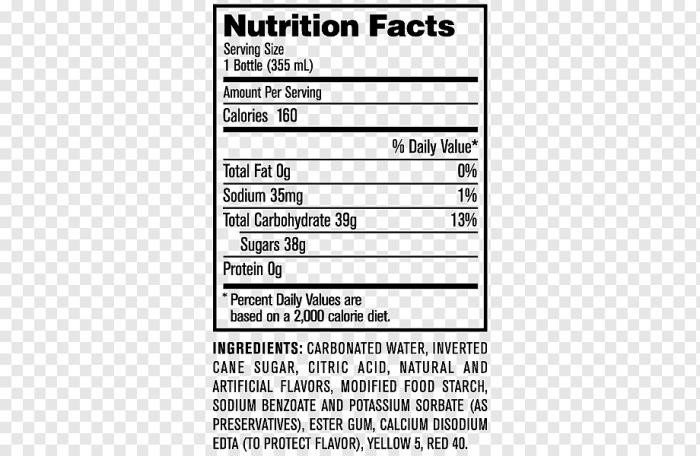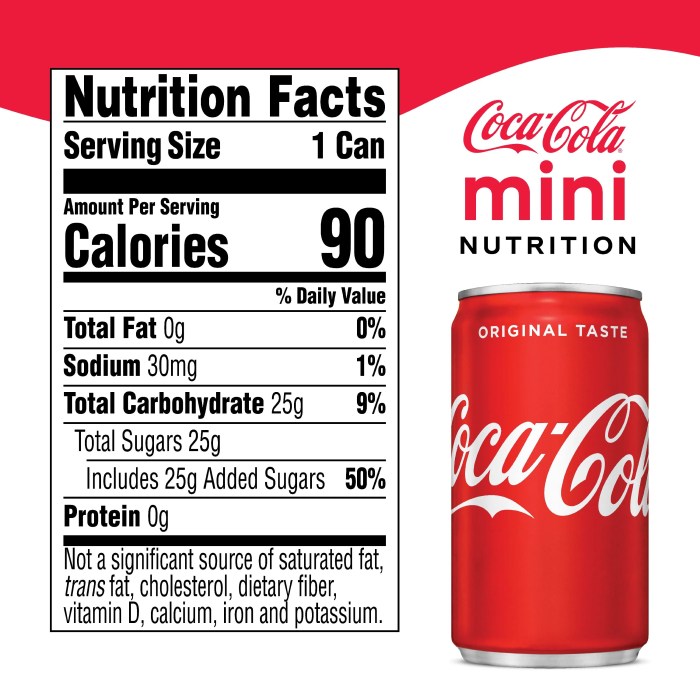Nutritional Content Variation

Can of soda nutrition facts – Okay, so you wanna know about the sneaky differences in those fizzy drinks, eh? From the classic Coke to the zesty Sprite, they all pack a punch, but not in the same way. Let’s break it down Pontianak style – no sugarcoating!
Right, so you’re checking the sugar levels in that can of fizzy pop, innit? Loads of hidden nasties, but compare that to the amount of natural sugars in fruit, like, check out the nutrition facts for grapes green seedless – a proper difference, bruv. Then you can properly see how much healthier a snack of grapes is compared to that sugary soda.
Back to that can of soda, though – it’s a proper sugar bomb, innit?
The nutritional content of sodas varies wildly depending on the brand, the type (regular vs. diet), and the sweeteners used. It’s not just about the sweet taste; it’s about the impact on your body, especially your sugar intake and calorie count. Choosing wisely can make a big difference in your overall health.
Comparison of Nutritional Content Across Soda Brands
Here’s a quick rundown of some popular brands. Remember, these are approximate values and can vary slightly depending on the serving size and production batch. Always check the label on the can for the most accurate information!
| Brand | Serving Size (ml) | Sugar Content (grams) | Calories |
|---|---|---|---|
| Coca-Cola | 355 | 39 | 140 |
| Pepsi | 355 | 41 | 150 |
| Sprite | 355 | 39 | 140 |
Differences Between Regular and Diet Sodas
The main difference between regular and diet sodas lies in the type and amount of sweetener used. This significantly impacts their calorie and sugar content.
- Regular sodas are typically loaded with sugar, usually in the form of high-fructose corn syrup (HFCS), contributing significantly to their calorie count.
- Diet sodas, on the other hand, use artificial sweeteners like aspartame, sucralose, or saccharin to replace sugar. This drastically reduces their calorie and sugar content, often to near zero.
- However, while diet sodas are lower in calories and sugar, some people experience digestive issues or other side effects from artificial sweeteners.
- The taste profile also differs; diet sodas often have a slightly different aftertaste compared to their regular counterparts.
Impact of Different Sweeteners
The choice of sweetener dramatically affects the nutritional profile of a soda. Understanding these differences can help you make informed choices.
- High-fructose corn syrup (HFCS): A common sweetener in regular sodas, HFCS is a highly processed sweetener linked to various health concerns, including weight gain and metabolic issues. It’s primarily composed of fructose, which is metabolized differently than glucose, potentially contributing to increased fat storage in the liver.
- Aspartame: An artificial sweetener used in many diet sodas, aspartame is significantly lower in calories than sugar. However, concerns regarding its safety have been raised, though research continues to be inconclusive. Some individuals report experiencing headaches or other side effects after consuming aspartame.
- Sucralose: Another popular artificial sweetener, sucralose is known for its intense sweetness and is generally considered safe for consumption in moderate amounts. However, some studies suggest potential long-term health effects, and further research is needed.
Health Implications of Soda Consumption: Can Of Soda Nutrition Facts

Eh, so you think those fizzy drinks are just a harmless treat, eh? Think again, my friend. Regular soda consumption can seriously mess with your health in ways you might not even realize. We’re talking about more than just a sugar rush; we’re talking about long-term health risks that can really put a damper on your – hidup*.The high sugar content in most sodas is the main culprit.
This isn’t just any sugar; we’re talking about added sugars, which are often processed and lack the nutritional benefits of natural sugars found in fruits. These added sugars wreak havoc on your body in several ways, contributing to a bunch of health problems. Think of it like this: it’s like constantly adding extra fuel to a car without ever letting it burn it off— eventually, things start to break down.
Weight Gain
Excess sugar in soda contributes significantly to weight gain. Your body processes sugar quickly, leading to a rapid spike in blood sugar levels. This triggers the release of insulin, which helps your body store the excess sugar as fat. Consistent consumption of sugary drinks means your body is constantly storing fat, leading to weight gain and, potentially, obesity.
Imagine this: You drink a large soda every day, adding hundreds of extra calories without any nutritional value. That’s a recipe for packing on the pounds, faster than you can say “eh, satu lagi lah!”
Type 2 Diabetes
The constant influx of sugar from soda overloads your body’s ability to regulate blood sugar. This can lead to insulin resistance, a condition where your body’s cells become less responsive to insulin. Over time, this can develop into type 2 diabetes, a serious chronic condition characterized by high blood sugar levels. Consider this: a study showed a direct correlation between regular soda consumption and an increased risk of developing type 2 diabetes, especially in individuals already predisposed to the condition.
It’s a serious risk, and one you don’t want to gamble with.
Tooth Decay
The high sugar content in soda isn’t just bad for your waistline; it’s also a major contributor to tooth decay. The sugar feeds the bacteria in your mouth, producing acids that erode tooth enamel. This can lead to cavities, gum disease, and other dental problems. Think of it like this: every sip of soda is like a tiny acid bath for your teeth.
Regular consumption, without proper oral hygiene, is a fast track to dental problems and expensive trips to the dentist.
Infographic: Soda Consumption and Health Issues
Imagine a simple graphic. A central image of a soda can is connected by arrows to three boxes.Box 1: Weight Gain: Shows a person with excess weight, with the number of extra calories in a typical soda can clearly stated.Box 2: Type 2 Diabetes: Shows a blood glucose meter displaying a high reading, with a brief explanation of insulin resistance.Box 3: Tooth Decay: Shows a tooth with a cavity, highlighting the acidic nature of soda and its impact on enamel.
Alternative Beverage Choices
Okay, so you’re clued up on why soda’s not your best bet, eh? Now let’s talk about someway* better options to quench your thirst and keep your body happy. We’re gonna swap that sugary fizz for some seriously refreshing and nutritious alternatives. Think of it as upgrading your hydration game, Pontianak style!
Nutritional Comparison of Beverages, Can of soda nutrition facts
Choosing the right drink is like picking the right song for your mood – it makes all the difference! Here’s a quick rundown comparing soda to healthier choices. Remember, these are average values and can vary based on brand and serving size. Always check the nutrition label!
| Beverage Type | Calories (per 12 oz serving) | Sugar Content (grams per 12 oz serving) | Other Key Nutrients |
|---|---|---|---|
| Regular Soda | 150-180 | 39-40 | Minimal to none; mostly empty calories. |
| Water | 0 | 0 | Essential for bodily functions; helps with digestion and nutrient absorption. |
| Unsweetened Iced Tea | 0-5 | 0-1 | Antioxidants (depending on tea type); can be a good source of hydration. |
| 100% Fruit Juice (4oz serving) | 60-80 | 15-20 | Vitamins and minerals (varies by fruit); natural sugars, but limit consumption due to sugar content. |
Benefits of Healthier Beverage Alternatives
Switching from soda to healthier drinks isn’t just about cutting calories; it’s a whole body upgrade! Think clearer skin, more energy, and a lower risk of health problems like diabetes and weight gain. You’ll feel lighter, fresher, and ready to conquer your day – like a true Pontianak powerhouse! Seriously, the difference is amazing.
Making Healthier Beverage Choices Based on Individual Needs
Choosing the right drink depends on your lifestyle and what your body needs. For instance, if you’re super active, you might need extra electrolytes, so consider adding a pinch of salt to your water or opting for coconut water. If you’re watching your sugar intake, unsweetened tea or infused water (with cucumber, lemon, etc.) are your best friends. If you need a vitamin boost, a small serving of 100% fruit juice can be part of a balanced diet, but remember moderation is key! Listen to your body, and choose drinks that make you feel good – inside and out.
It’s all about finding your perfect hydration rhythm.
Questions Often Asked
What are the long-term effects of drinking diet soda?
While diet soda lacks sugar, some studies suggest potential links to metabolic issues and cardiovascular problems due to artificial sweeteners. More research is needed to definitively establish these links.
Are all sodas created equal in terms of ingredients?
No, different brands and types of soda use varying sweeteners, artificial colors, and preservatives. Always check the ingredient list for specific details.
How can I reduce my soda consumption gradually?
Start by slowly decreasing your daily intake, replacing soda with water, unsweetened tea, or other healthier alternatives. Gradually wean yourself off completely.
What are some good alternatives to soda for kids?
Water, milk (low-fat or skim), unsweetened fruit juice (in moderation), and diluted fruit juice are all better options for children.


